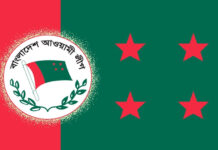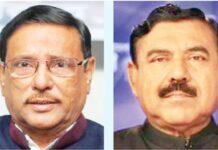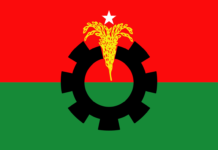The 9th parliamentary election of Bangladesh has been considered as the “best election in the country's history.” One of the reasons for this success was the caretaker government (CTG). The initiatives taken by the Chief Election Commission were supported by the then CTG.
This election that set best practice in many areas and the achievement of the Commission has raised the expectations of the people to see freer, fairer and more credible elections in future. If the CTG is not reinstated, it would be a challenge for the EC to hold free and fair election.
In the changing context, the following issues could be considered which might help EC organize a free and fair election.
The EC is now preparing an electoral roll for the next election. One of the reasons of the failure in the January 22, 2007, election was the faulty voter list, which had 12.2 million excess or duplicated names. So the EC must ensure 100% authenticity of the voter list.
To do this, it should conduct a survey either by an independent agency or a team of experienced distinguished persons of the country that will not only promote EC for further improvement of the list but also increase the credibility of the EC by bringing trust of the people.
A good election depends on pre-election planning. We all know that the Commission drafted a roadmap, shared it with various stakeholders and moved forward with the final one. Also, an all-inclusive budget in line with the planning is crucial to meet the election expenses.
As we have about one year time in hand, the EC should prepare a comprehensive plan and budget, discuss the plan with the stakeholders and submit it to the government. The role of government here would be to provide the fund without any questions.
Certainly, after election the concerned department of the government will do the auditing. If the government does not agree to provide fund, the EC should inform the people of the country through a press conference.
A free and fair election mostly depends on the election-day — a role of the temporary poll workers such as Returning Officers (ROs) and Presiding Officers (POs). The ROs are recruited from the admin cadre who are known to be highly politicised.
Under a political government, it would be a big challenge for EC to ensure neutrality of the ROs. By law, ROs are responsible to recruit POs who are all in all in polling stations. In order to ensure the neutrality of these officials, EC should prepare a list of potential ROs, publish it in the website and newspapers for voters comment and finalise the list based on the comment of the voters.
Moreover, in the current legal context, EC only can recommend punishment if an RO violates election rules. To keep the neutrality of ROs, EC can propose a new law which would allow it to form a high-level committee with the authority to fire the ROs for tempering election.
On the other hand, POs, who are currently recruited by the ROs, could be recruited by the local election offices. The local office could make a potential long list for each of the constituency. This list should also be published in the EC website for voters' comment before finalising.
Unlike ROs, they also could be fired by EC for election engineering.
Secretary is the administrative head of the EC secretariat. Although, the Election Commission Secretariat Act 2009 provides that the secretary is accountable to the CEC for his duties and responsibilities, the position has scope to guide or misguide commission for engineering the election.
The current practice of recruiting secretary and additional secretary is that they are deputed from administration cadre and then back to the government. EC could move to revise the law with a provision that the secretary and additional secretary, once in the EC must not go back to the government. They will retire from the EC.
This will empower secretary and additional secretary to work more independently and their role would be out of question by any quarter.
All kinds of election-engineering such as buying votes, making extra expenditures, violations of code of conducts occur during the campaign, cooling period and the election day. Controlling these electoral misdeeds is a great challenge for EMBs worldwide.
In order to address these issues, EC could form an Election Monitoring Committee for each constituency consisting of local election officials and CSO/NGO representatives. The committee could be given the responsibility to monitor all activities in relation to the election. To do this, if necessary, law should be revised.
There is a co-relation between impartial election observation and a free and fair election. Observing election is, thus, an important integrity safeguard. It works as checks-and-balances that protect viability and honesty of election administration and participation of all stakeholders.
In order to frame a complete picture of a polling station, it is important to stay in a polling station all the way through. Although Bangladesh does not allow stationary observation, many countries of the world such as Georgia, Afghanistan, Sri Lanka allow observers to stay in the polling stations the whole day.
Stationary observation would be more effective rather than the mobile observation. So EC should revise the observers' guidelines and permit both stationary and mobile observation.
Media plays a vital role in three ways, i.e. communicating political messages from parties and candidates; relaying important voter information from election administrators; and subjecting the whole election process to independent scrutiny and comment.
Although EC during the previous years initiated to distribute the slots for the political parties in the state-owned media, there is no permanent code of conduct for them. Moreover, Bangladesh now has a vibrant private media — both electronic and print. In order to ensure a level-playing field in the election, a code of conduct for all media is very important.
EC could move forward for this.
The presence of army always carries a significant impact in elections here. In all the elections held since 1991 the army was deployed. After 2008 election, the RPO was changed and there was no scope to deploy army under the current legal context.
If we recall the post-election situation of 2001 and 2008, we all will agree to deploy army in elections. In this issue, EC must not consider any alternative.
All these suggestions can only be implemented if EC initiates and government agrees. We hope these two parties will move forward with these and the nation will see another free and fair election.
Source: The Daily Star









